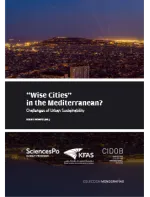Urban Sprawl and Politics in Saudi Arabia

Saudi cities have sprawled during the past fifty years. Suburbanisation has posed issues of sustainability and equitability: energy and water consumption, housing and transportation costs have soared, increasing class differences and dissolving urban society into smaller, disconnected units. Meanwhile, state institutions have devised few mechanisms of participation: if limited municipal elections have been held since 2005, strong state repression and disenfranchisement of non-citizen populations have ensured the permanence of several rifts, between haves and have-nots, citizens and non-citizens, men and women, urbanites and rural migrants. Pre-sprawl urban governance, characterised by personalised relationships, informality and the density of political and social networks, has been on the wane since the 1970s. Scattered and divided populations are now placed under the heavy surveillance of the state. Organising any form of collective action in these conditions is a challenge.